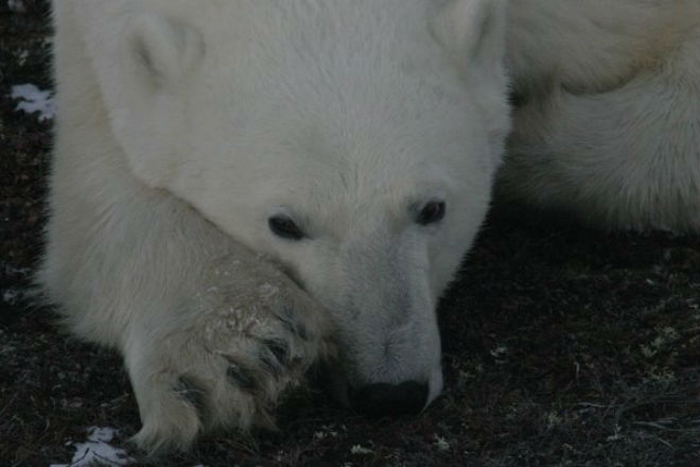Hungry Polar Bears Decimating Seabird Colonies

While the iconic images of polar bears in a warming world are arguably of starving bears shivering on ice floes, or of bears swimming great distances as those floes disappear, a different scene may be a more accurate portrayal of the animal's near future: hungry polar bears decimating colonies of nesting seabirds.
"Picture instead," writes Daniel Grossman in a post for Yale Climate Connections, "a cream-colored bear loping on land, across tundra, and along the pebbled shores." Forced to venture ashore in search of sustenance, this hypothetical bear is fighting off hunger by snacking on bird eggs.
The image is fully grounded in fact. As Grossman notes, polar bears have increasingly been observed marauding through colonies of seabirds as they seek alternate sources of sustenance in the absence of sea ice.
Polar Bears Found Rock Climbing in the Arctic
A 2010 study, for example, documented four cases of polar bears eating snow goose eggs, and the chicks and eggs of thick-billed murres, in Arctic Canada – with the bears in some instances even clambering up cliff faces to reach the nests.
And just last year, a team of European researchers reported that, in Greenland and the Svalbard Archipelago, bear raids on colonies of common eiders, glaucous gulls and barnacle geese, rarely if ever seen before 2000, are now commonplace.
Some scientists have argued this shows that concern over polar bears' future is overstated and that the species may be able to survive the absence of their usual sea-ice-dwelling seal prey by switching to birds and to coastal Arctic land mammals such as caribou.
Get the world’s most fascinating discoveries delivered straight to your inbox.
Video: Why Polar Bears Don't Hibernate
Theirs, however, is very much a minority position; others have calculated that such terrestrial food intake is "insufficient to offset lost ice-based hunting opportunities," although they warn that it "can have ecological consequences for other species."
This is what concerns Jouke Prop, a Dutch ornithologist who was one of the team that reported its findings from Greenland and Svalbard. He has observed polar bears eating more than 200 eggs in two hours; in 2014, no chicks or eggs of any of the three species species at his study sites survived.
According to a 2012 study, the combined effects of polar bear predation and parasitism by mosquitoes (itself likely also increasing as a result of higher temperatures) reduced the overall productivity of a thick-billed murre colony in Canada's Hudson Bay by 20 percent in one year, and also increased adult mortality by 20 percent.
Arctic Grizzlies Bully Polar Bears
"If this effect happens every year," the study's authors concluded, "it will have population consequences."
Originally published on Discovery News.
 Live Science Plus
Live Science Plus





